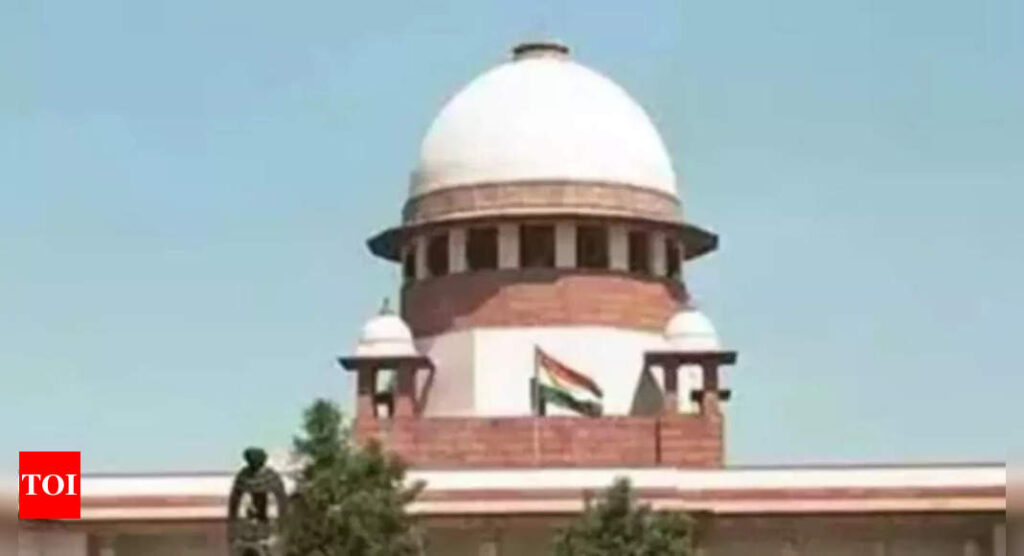[ad_1]
NEW DELHI: The Supreme Court on Thursday upheld the constitutional validity of various provisions of Insolvency and Bankruptcy Code (IBC), including Section 95, which allows creditors to initiate insolvency proceedings against personal guarantors.
A bench of Chief Justice D Y Chandrachud and Justices J B Pardiwala and Manoj Mishra rejected a plea against the provisions of the IBC and dismissed more than 200 petitions filed against the provision alleging violation of principles of natural justice in the process followed under the code.
While the law was enacted in 2016, in 2019 it was amended to incorporate provisions related to personal guarantors instead of limiting it to companies that were not settling the liabilities to their creditors. While seeking loans, promoters and related entities often provide personal guarantees to banks in addition to other collaterals.
The decision will help creditors to aggressively pursue action against ousted promoters of several companies that underwent insolvency resolution, including the likes of Anil Ambani, Bhushans of Bhushan Steel and Ruias of Essar Steel, among a host of other high-profile businessmen.
Till September-end, close to 2,300 cases had been filed against personal guarantors for initiation of personal insolvency resolution with claims topping Rs 1.6 lakh crore. So far, only 282 cases have been admitted, of which 21 have so far resulted in creditors realising Rs 91 crore, which is just 5.2% of their claims, according to data available with the Insolvency and Bankruptcy Board of India.
The apex court’s ruling is the latest endorsement of IBC, whose legality has been challenged on multiple counts.
The bench came to the conclusion that law does not suffer from any arbitrariness and upheld the validity of Sections 95(1), 96(1), 97(5), 99(1), 99(2), 99(4), 99(5), 99(6), and 100 of the IBC. The court turned down a plea that there should be some form of an adjudicatory process before the appointment of a resolution professional (RP) under Section 97 of the IBC. The National Company Law Tribunal (NCLT) appoints an RP to manage the insolvency resolution along with a committee of creditors.
“We are of the view that the argument that an adjudicatory role be imposed before section 97 cannot be accepted … We have come to the conclusion that reading an adjudicatory role in section 97 will render Section 99 and Section 100 of the IBC otiose,” the court said.
It also said that resolution professionals cannot be conferred adjudicatory powers. “The role under Section 99 which is ascribed to the resolution professional is that of a facilitator who has to gather relevant information and recommend acceptance or rejection of application. (It) leaves no manner of doubt that resolution professional is not intended to perform an adjudicatory function or to arrive at binding decisions on facts and it is only a recommendation which has no binding force,” the court said.
A bench of Chief Justice D Y Chandrachud and Justices J B Pardiwala and Manoj Mishra rejected a plea against the provisions of the IBC and dismissed more than 200 petitions filed against the provision alleging violation of principles of natural justice in the process followed under the code.
While the law was enacted in 2016, in 2019 it was amended to incorporate provisions related to personal guarantors instead of limiting it to companies that were not settling the liabilities to their creditors. While seeking loans, promoters and related entities often provide personal guarantees to banks in addition to other collaterals.
The decision will help creditors to aggressively pursue action against ousted promoters of several companies that underwent insolvency resolution, including the likes of Anil Ambani, Bhushans of Bhushan Steel and Ruias of Essar Steel, among a host of other high-profile businessmen.
Till September-end, close to 2,300 cases had been filed against personal guarantors for initiation of personal insolvency resolution with claims topping Rs 1.6 lakh crore. So far, only 282 cases have been admitted, of which 21 have so far resulted in creditors realising Rs 91 crore, which is just 5.2% of their claims, according to data available with the Insolvency and Bankruptcy Board of India.
The apex court’s ruling is the latest endorsement of IBC, whose legality has been challenged on multiple counts.
The bench came to the conclusion that law does not suffer from any arbitrariness and upheld the validity of Sections 95(1), 96(1), 97(5), 99(1), 99(2), 99(4), 99(5), 99(6), and 100 of the IBC. The court turned down a plea that there should be some form of an adjudicatory process before the appointment of a resolution professional (RP) under Section 97 of the IBC. The National Company Law Tribunal (NCLT) appoints an RP to manage the insolvency resolution along with a committee of creditors.
“We are of the view that the argument that an adjudicatory role be imposed before section 97 cannot be accepted … We have come to the conclusion that reading an adjudicatory role in section 97 will render Section 99 and Section 100 of the IBC otiose,” the court said.
It also said that resolution professionals cannot be conferred adjudicatory powers. “The role under Section 99 which is ascribed to the resolution professional is that of a facilitator who has to gather relevant information and recommend acceptance or rejection of application. (It) leaves no manner of doubt that resolution professional is not intended to perform an adjudicatory function or to arrive at binding decisions on facts and it is only a recommendation which has no binding force,” the court said.
[ad_2]
Source link











More Stories
We can’t wait to face India in the final: Pat Cummins | Cricket News
Railways plans 3,000 additional trains in next 4-5 years to minimise number of waitlisted tickets | India News
Faridabad: Man dies after ‘falling from hotel room window’ while partying with friends